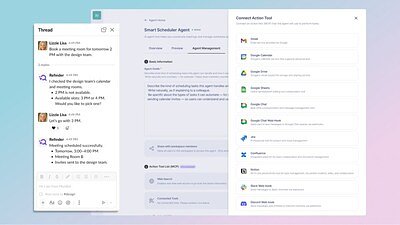
Beyond Bots: Refinder AI Aims to Orchestrate Teamwork, Not Just Tasks
Thinkfree’s Refinder AI Agent moves beyond individual productivity, aiming to orchestrate team workflows and data access. Can this collaborative approach unlock a new level of efficiency in the age of AI?
Beyond Bots: Refinder AI Aims to Orchestrate Teamwork, Not Just Tasks
Seoul, South Korea – The AI landscape is rapidly shifting. While much of the focus remains on tools designed to boost individual productivity, a growing number of companies are betting on AI's potential to fundamentally reshape teamwork. Thinkfree, a Seoul-based software provider, recently launched its Refinder AI Agent, a platform designed to connect various business applications and automate workflows – not just for individuals, but for entire teams. But in a crowded market of AI assistants and automation tools, can Refinder carve out a unique niche? And is this collaborative approach truly the future of work?
Refinder isn’t just about automating tasks; it’s about orchestrating the flow of information and action between team members. The platform integrates with popular tools like Slack, Google Chat, Jira, Notion, and Google Workspace, allowing users to execute commands – “Schedule a meeting with the marketing team,” “Summarize the latest Jira sprint,” or “Update the project status in Notion” – through a natural language interface. The promise is a significant reduction in context switching and a streamlined workflow, where information flows seamlessly between systems and individuals.
“Most AI agents today focus on personal productivity,” explains Deekay Kim, CEO of Thinkfree. “Refinder takes a broader approach. It's a collaborative AI platform designed for both individuals and teams.” This emphasis on team collaboration is a key differentiator for Refinder, setting it apart from many of its competitors, like UiPath, Automation Anywhere, and even Microsoft’s Power Automate, which historically prioritized individual or departmental automation.
Beyond Automation: The Rise of Orchestration
The shift from task automation to workflow orchestration is a subtle but important one. Automation focuses on eliminating repetitive tasks, while orchestration focuses on managing the entire process, coordinating multiple steps and ensuring that information flows smoothly between systems and people. This is particularly crucial in today’s complex work environments, where teams often rely on a multitude of applications and struggle with information silos.
“The biggest challenge for many teams isn’t necessarily doing the work, it’s finding the information and coordinating the various steps involved,” says an anonymous IT manager at a mid-sized marketing agency who has been piloting Refinder within their team. “Refinder helps to bridge those gaps and streamline the entire process.”
However, achieving this level of orchestration requires more than just connecting applications. It also requires a robust data model and a way to understand the context of each request. Refinder addresses this through its implementation of the Model Context Protocol (MCP), a standard designed to standardize the way AI agents interact with different data models. While MCP is not yet universally adopted, its potential to improve interoperability between AI systems is gaining traction.
Thinkfree’s Strategic Pivot
For Thinkfree, the launch of Refinder represents a bold strategic pivot. The company, historically known for its online office suite, is now betting heavily on AI-powered automation and collaboration. This transition isn’t without risk. The AI market is fiercely competitive, and Thinkfree is up against well-established players with deep pockets.
“This is a significant departure from their traditional business model,” notes a technology analyst who follows the AI space. “They’re essentially reinventing themselves as an AI-first company. Whether or not that gamble pays off remains to be seen.”
Furthermore, ensuring data security and privacy is paramount. Refinder’s workspace-level Role-Based Access Control (RBAC) aims to address these concerns, providing granular control over who can access what information. However, with data breaches becoming increasingly common, robust security measures are essential to maintain user trust.
Challenges and the Future of Collaborative AI
Despite the potential benefits, implementing collaborative AI platforms like Refinder isn't without its challenges. One common obstacle is user adoption. Getting teams to embrace new tools and workflows requires effective training and a clear understanding of the value proposition. Another challenge is data integration. Connecting disparate systems and ensuring data consistency can be complex and time-consuming.
“The biggest hurdle isn’t the technology itself, it’s getting people to change their habits,” explains the anonymous IT manager. “We had to invest a lot of time in training and support to get everyone comfortable with the new system.”
Looking ahead, the future of collaborative AI appears bright. As AI technology continues to evolve, we can expect to see even more sophisticated platforms that can seamlessly orchestrate complex workflows and empower teams to work more effectively. The key will be to move beyond simple task automation and focus on building intelligent systems that can understand the context of each request, anticipate user needs, and proactively facilitate collaboration.
Refinder, with its focus on team collaboration and its commitment to open standards like MCP, is positioning itself to be a key player in this emerging landscape. While the road ahead is undoubtedly challenging, Thinkfree’s bold vision and its commitment to innovation suggest that this collaborative AI platform has the potential to unlock a new level of efficiency and productivity in the age of AI.
